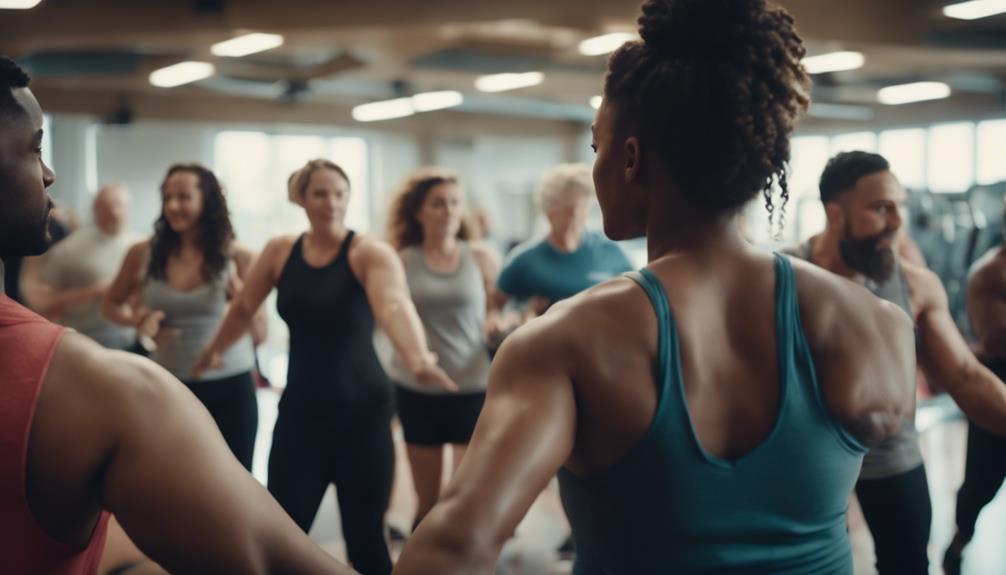As I reflect on the prevalence of weight stigma, it’s staggering to note that studies have shown it impacts individuals across various age groups and backgrounds.
The detrimental effects of societal pressures to conform to certain body standards can lead to profound consequences on both physical and mental well-being.
By exploring practical strategies and shifting our focus towards fostering body positivity, we can pave the way for a more inclusive and supportive environment for everyone.
Join me in uncovering effective ways to challenge weight stigma and promote a healthier relationship with our bodies.
Understanding Weight Stigma
Weight stigma, fueled by negative attitudes and beliefs surrounding body size, permeates various aspects of society. It’s perpetuated by media, peers, and even healthcare professionals. This discrimination based on body size not only affects individuals’ self-esteem but also has detrimental effects on mental health.
People subjected to weight stigma often experience bullying and struggle with seeking help for disordered eating due to fear of judgment. Additionally, weight stigma contributes to decreased physical activity levels and can create barriers to accessing quality healthcare services.
Understanding the impact of weight stigma is crucial in promoting body diversity and creating a more inclusive environment for individuals of all body types. By challenging these harmful beliefs and behaviors, we can work towards a society that values health and well-being over appearance.
Promoting Health Over Appearance
Understanding the impact of prioritizing health over appearance is pivotal in fostering a positive relationship with our bodies and promoting overall well-being.
Reasons to Promote Health Over Appearance:
- Health is Wealth: Investing in our health pays dividends in overall well-being.
- Breaking Stigma: Shifting the focus to health challenges weight stigma implications.
- Empowerment through Activity: Physical activity boosts self-esteem and supports mental well-being.
- Nourish the Soul: Mindful eating fosters a balanced approach to nutrition and enhances health goals.
Benefits of Physical Activity

Regularly engaging in physical activity has been shown to have numerous benefits for mental well-being and overall health. Physical activity not only improves mental well-being by reducing symptoms of depression and anxiety but also promotes the release of endorphins, which are natural mood lifters, leading to a more positive outlook. Moreover, it plays a crucial role in boosting self-esteem and body image, fostering empowerment and confidence. Additionally, physical activity supports weight management by increasing metabolism and enhancing overall health. Furthermore, exercise is linked to improved cognitive function, potentially reducing the risk of aging-related cognitive decline.
| Benefits of Physical Activity | |
|---|---|
| Mental Well-being | Reduced depression and anxiety symptoms |
| Self-esteem | Boosts confidence and body image |
| Weight Management | Supports metabolism and overall health |
| Cognitive Function | Enhances brain health and reduces cognitive decline |
Practicing Intuitive Eating
Listening attentively to your body’s hunger and fullness signals is fundamental when practicing intuitive eating.
Embracing Intuitive Eating:
- Connect with Your Body: Tune in to your body’s cues to guide your eating habits.
- Nourish with Intention: Choose foods that satisfy both your physical and emotional needs.
- Embrace Mindfulness: Be present during meals to enjoy and appreciate the eating experience fully.
- Reject Diet Mentality: Shift focus from restrictive eating to honoring your body’s natural signals.
Embracing intuitive eating fosters a healthy relationship with food, promoting improved body image, self-esteem, and psychological well-being. By adopting this non-diet approach, individuals can break free from harmful dieting cycles, reduce emotional eating, and enhance overall health outcomes.
Advocating for Body Diversity

Advocating for body diversity involves accepting and celebrating diverse body shapes, sizes, and appearances. Embracing body diversity is a powerful way to highlight the beauty and value in all bodies, regardless of societal standards.
By supporting body diversity initiatives, we can promote inclusion and representation of all individuals, fostering a positive body image culture. This advocacy challenges narrow beauty ideals and encourages self-acceptance and self-love for all body types.
Celebrating body diversity helps combat weight stigma by emphasizing the uniqueness and diversity of every individual’s body. It’s essential to continue advocating for body diversity to create a more inclusive society where everyone feels accepted and valued for who they are.
Educating About Harmful Effects
Educating about the harmful effects of weight stigma is crucial in raising awareness about its impact on mental health and overall well-being.
Why Educating About Harmful Effects is Essential:
- Mental Health: Weight stigma can lead to increased levels of anxiety, depression, and low self-esteem.
- Self-Esteem: It can erode one’s confidence and perpetuate negative body image.
- Physical Health: Weight stigma may discourage individuals from seeking medical care, worsening health outcomes.
- Social Well-Being: It can isolate individuals, hindering social connections and support systems crucial for overall well-being.
Understanding the detrimental effects of weight stigma empowers individuals to challenge societal norms and foster a more inclusive and positive environment promoting body positivity.
Creating Supportive Environments

Understanding the importance of creating supportive environments is key to challenging weight stigma and fostering a culture of inclusivity and acceptance. Supportive environments promote respect and acceptance of diverse body sizes, creating safe spaces for individuals to share experiences related to weight stigma.
By encouraging open dialogue about weight stigma and body positivity, we can educate others and raise awareness about the impact of harmful stereotypes. Offering resources like counseling, support groups, and educational materials empowers individuals to address and overcome internalized weight bias.
Implementing inclusive policies in workplaces, schools, and healthcare settings contributes to a more supportive environment for all. Let’s work together to build environments that embrace diversity and promote respect for all body types.
Gain a new perspective on body image and the potential harm of seemingly innocent compliments in this insightful article on Brit + Co.
Conclusion
In conclusion, we can challenge weight stigma and promote body positivity by shifting our focus from appearance to overall health and well-being, practicing mindful eating, embracing body diversity, and advocating for inclusive policies.
Educating others on the harmful effects of weight stigma and creating supportive environments that celebrate all body types is essential.
Let’s work together to foster a culture of acceptance and self-love for everyone.



